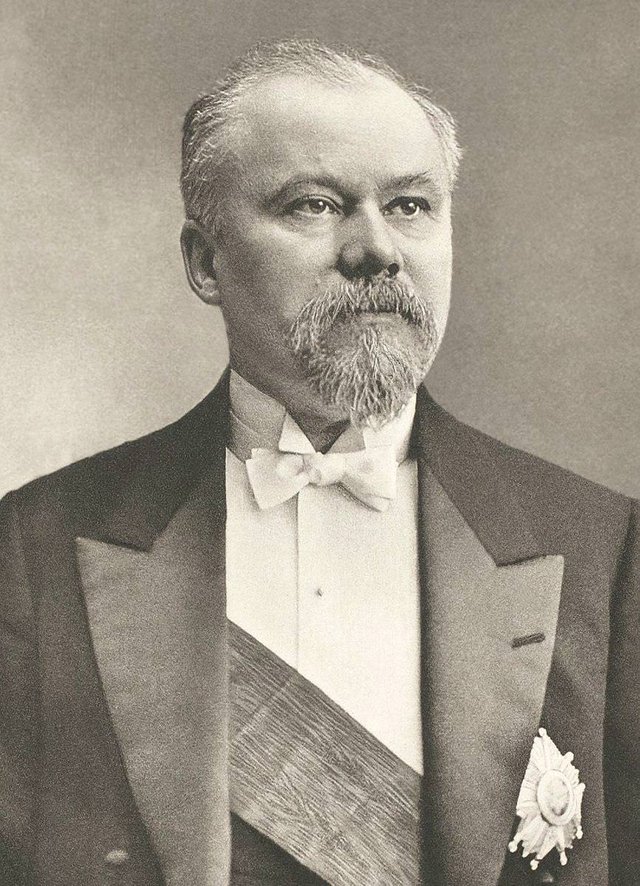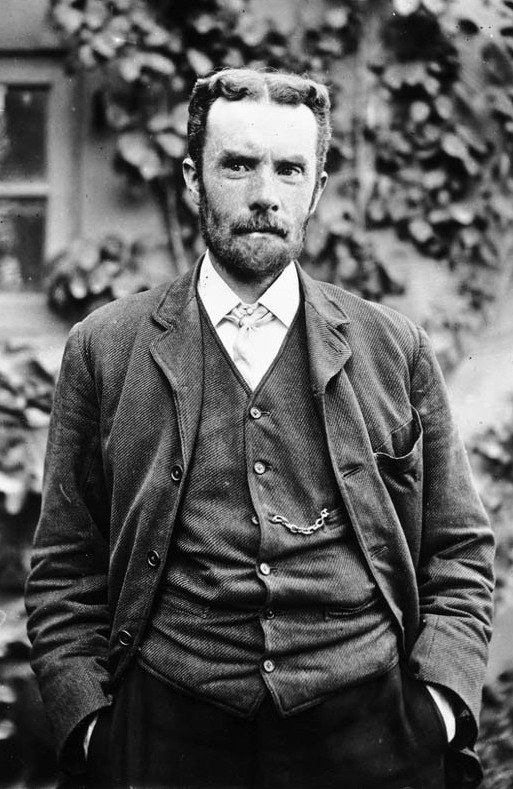Gravitational waves - from proposals to observations
The Virgo Interferometer is something spectacular. With two arms 3km in length, it's one of the biggest machines ever made in the history of the world, behind things like LIGO and the LHC. All for science.
But some mysterious figure didn't just come up with it one day and had it approved for construction the next, the journey atop giants' shoulders was long and wrought with complicated maths people like me could never hope to understand.
Today I thought it would be worthwhile putting some time aside to learn a little more about some of the giants who constructed this monolithic structure with the power of their brains - Einstein aside.
Henri Poincaré

Public Domain
A long, long time ago around 240BC, the Greek poet (also mathematician I guess) Eratosthenes decided to shove a stick in the ground in Alexandria, Egypt, and made another man travel to Southern Egypt to shove another stick in the ground there.
By measuring the difference in shadows at the same time of day, he managed to figure out that the earth was round, and how big it was to surprising accuracy of between 1% and 16% (depending on how you measure 'stadia'), roughly around 44,100 km. Quite an accomplishment given we now know it's about 40,075.017km. Give or take.
Though Eratosthenes managed to prove something he could not possibly see for himself - indeed we could not possibly see until space agencies took us into the Great Void Above - Poincaré decided he could essentially take this one step further do the same thing with the entire Universe.
We call this the Poincaré Conjecture, for which he is most famous. You can Learn more about it in this video, but in short it took over a century of people coming up with false proofs for his outlandish idea to inevitably become proven by an eccentric, isolated Russian, Grisha Perelman who went on to turn down a million dollars and the equivalent of a nobel prize, the Fields Medal, before fading back into obscurity.
But Poincaré is also responsible for first proposing the existence of gravitational waves, 11 years before Einstein made his predictions, something that both LIGO and VIRGO slipped up on in a publication a few years back, instead attributing to Einstein.
By building on the theory of special relativity and the Lorentz Transformations, he concluded that gravitation must emanate outwards, at the speed of light rather than instantaneously, as waves do - in a similar fashion to Electromagnetism.
A decade later, Einstein incorporated these ideas into his paper Approximative Integration of the Field Equations of Gravitation.
References
Sur la dynamique de l'électron | Henri Poincaré Predicted The Existence Of Gravitational Waves As Early As June 5, 1905
Oliver Heaviside

Public Domain
So Poincaré was the first, except... he wasn't really.
Oliver Heaviside was a rather brilliant Englishman, having self-taught electrical engineering, mathematics, physics and more.
He was no mathematical amateur either. After stumbling upon Maxwell's paper Treatise on Electricity and Magnetism. and describing it as:
Great, greater and greatest, with prodigious possibilities in its power
He buckled down for the better part of a decade studying Maxwell's work with passion until finally following his own path.
In 1893, a full 23 years before Einstein's predictions, Heaviside made some pretty bold deductions. In his paper A Gravitational and
Electromagnetic analogy, he wanted to align gravitational energy with the likes of electric and magnetic energies a la Maxwell.
Upon considering velocity of propagation as finite, he continued his comparisons and concluded, roughly, the existence of gravitational waves.
References
The Prediction of Gravitational Waves in 1893 | The Secret History of Gravitational Waves
Pierre-Simon Laplace
Ok, so the idea that gravitation traveled at finite speeds was hardly new, with Laplace discussing this idea as far back as 1770. Numerous others had also touched on this, but the ideas, far from refined, required Poincaré and eventually Einstein to truly hammer home the details.
In fact, it was Einstein alone who made the tangible, accurate predictions alongside details of their expected properties, such as how the waves wilil exhibit stretching in one direction and compressing in the other, much like sound waves and light, but way more complicated regarding the manipulation of space-time.
But where's the proof?
Introducing:
Kip Thorne, Barry Barish & Rainer Weiss
In 2017, these three lads won the nobel prize in Physics for the 'decisive contributions to the LIGO detector and the observation of gravitational waves'!
In 1984, the three co-founded the LIGO project in the US, and suddenly those elusive gravitational waves were about to lose their hiding spot. All of Einstein/Poincaré/Heaviside/Laplace's work was falling into place.
The workload was not a light one. Kip Thorne, for example, had to develop the mathematics in order to even be able to analyse the results should the experiment work, he had to analyse engineering designs that couldn't conceptually be tested beforehand, he helped identify wave sources, provide theoretical support, he designed the beam tubes, and invented 'quantum nondemolition designs' and ways to reduce thermoelastic noise.
All in a day's work!

Kip Thorne Credit: A. T. Service - CC BY-SA 3.0
On top of that, he even managed to squeeze in enough time to be the science advisor for Christopher Nolan's 'Interstellar' - a movie that depicts the most scientifically accurate black hole known to date - a full 2 years before signatures of gravitational waves were officially detected.
References
And here we are now, in 2018 (that is also the beginning of what is coined the gastrophysics era), a world where gravitational waves are a definitely real thing that we can almost touch with our bare hands. Ok, not quite. Detecting one of these waves is the equivalent of noticing the Milky Way stretched out about the length of your keyboard's delete key.
But we can touch the machines capable of doing that at say, oh I don't know, the SteemSTEM-Utopian.io meetup in Italy in September!
Nobel laureat Kip Thorne consulting on Interstellar: Proof that geeky scientists can be cool :P
Scientists are always cool ^^
Great read!
Eratosthenes is actually considered as the father of Geodesy, I talk about him and the process followed for the calculation of the Earth's circumference in this Geodesy post I uploaded 5 months ago. (It's too old, so nobody can accuse me of trying to promote my work here :P).
So basically if gravitational waves do exist, then we could possibly invent some sort of device that generates and/or manipulates gravity waves in order to distort the fabric of space-time, making interstellar travel possible?
Fascinating times! I'm very excited about the future!
Gravitational waves exist. This has been proved last year. Any accelerating mass generates gravitational waves. However, one needs something very very heavy to get waves that are observables. In other words, black holes or neutron stars.
Since we are not even far to only imagining producing a neutron star or a black hole, the answer to your question is 'no way' (at least for now) :D
Theoretically proven based on Einstine's relativity study but scientifically not for there is no existing particle that can travel the same speed as the light even if it is increasingly accelerating. Well, not unless if it is a blackhole. :)
It is more than just theoretical. I must disagree and confirm that black holes have somehow been experimentally observed.
The only way to generate the wave we observed comes from the collision of two black holes (or neutron stars). We have no other astrophysical object in our catalogue capable to be responsible for such observations. Of course, the observation could be due to something we don't know, but which mimics a black hole very very well (then let's call it a black hole in the meantime).
Concerning the speed of light, the neutron star events proved that gravitational waves travel at the speed of light, like photons and gluons by the way.
What about photons? They are zero mass particles that travel at the speed of light.
It represents a light so basically, it has similar features same as light and not more than the light can travel at 3x10^8 m/s. And also, particle must have mass enough to produce a certain amount of attracting force as it travels way beyond the speed of light. An object increases its mass as it travels a huge amount of speed say for example greater than light. Thus if it increases its mass then the force of attraction between anybody and that certain body increases.
The flaw here is that gravity does not involve only mass but also energy. In this way, photons are sensitive to gravity as well.
I guess I answered everywhere by now :)
Thanks for taking the time to clarify things!
It is always a pleasure! :)
I've no idea if it will become manipulable, but the results have a lot of other applications, such as being able to see how black holes form, seeing things before they emit light, seeing into supernovae, and general transformation of our understanding of the Universe. Hopefully.
I answered ^^
Henri poincare once said Science is built up of facts, as a house is built of stones, but an accumulation of facts is no more a science than a heap of stones in a house. The scientist does not study nature because it is useful, he studies it because he delights in it, and he delights in it because it is beautiful. If nature were not beautiful, it would not be worth knowing and if nature were not worth knowing life would not be worth living....Henri is a great man, nice post
Posted using Partiko Android
I tend to only partly agree with that. Scientists study nature because they want to understand how it works. That's it, IMO.
I'm in awe with the ancient Greek mathematician's ability to deduce the shape of the earth using nothing but some sticks, shadows and geometry. Now, all the trolls in the internet and offline claiming the earth is flat should be transported back to the cavemen era :)
Egyptians momies are hurt... believe me :D
i love science . Very helpful... thanks :)
A man is amazingly arranged, if he does not understand something or does not know, then he must explain this. As a result, we get something theoretical and close to fiction. Nothing with reality in common.
If gravity is a wave, then it is natural to assume that this is radiation. What is the logic of the process: the effects of radiation? Firstly, because from and to us it can not be a source of attraction in any way. In the second, it must also act on the body to repel, but it attracts. Probably all the above mentioned gentlemen think that this radiation first swept past our planet (I do not know if it's possible already and the speed was calculated), then it stops abruptly, turns around and starts pushing our planet to the sun.
Miracles and only.
Data (i.e. reality) confirmed everything. So I am afraid that everything above is correct. By the way, waves are not only radiation (or electromagnetism).
As for the proven fact, I will tell you an anecdote. Before Hegel came the news that the theory of universal gravitation suggested Newton a falling apple.
Hegel, these are the same tricks of the same subject!
Pretty business. First, because of this apple, we are expelled from paradise.
Then Paris inadvertently holds out the wrong apple
the Trojan War begins.
This is the third case - a bad omen for the philosophical sciences ....
Hegel: "And the crowd was captivated by Newton's teaching about gravity ... especially thanks to a miserable anecdote about how Newton saw the falling apple ... completely forgetting that the apple had already once served as the beginning of disasters for the entire human race, and then the cause for the death of Troy - an omen for the philosophical sciences "
Source Hegel. On the orbits of planets. Philosophical dissertation. I'm not going to say the exact page, I have a Russian edition p.252.
With waves there is also no logic. When you talk about a wave, what comes first is a wave on the water. Most likely from there the concept of this and it came. When I see a wave, I understand that the wave is a form of the body. The same shape as a ball or cube or a pyramid. Wave is not defining anything, but describing. A wave can not be something material. It is only an adjective to objects. Just like the ball is wooden or metal. Just the ball does not tell us anything. Just a wave without a foundation is nothing. And the second moment. For some reason it is believed that the wave is a movement. A wave is a form. And the wave on the water, water does not move. If it is displaced then very small distances. We just think that the wave is running up against us, in fact, water does not come to us. If such quantities of water moved towards the shore, then the banks would not have existed long ago, it would have been washed away.
Another waveform we can observe if two people retook the rope and will wave the wave. The rope does not break from our hands. Of course not. Everything is in its place.
I'll save the question. Why then a wave is used to describe the motion. If the wave is a form of manifestation and can not explain to us the source of its creation.
If the wave is not moving forward, but only a form of oscillation. How to describe the impact between two bodies at a distance.
Well, waves are very logical to me. And to many others as well. To make it short, is it because you don't find them logical that they do not exist?
Here, we have well-defined theoretical frameworks (electromagnetism, quantum mechanics, non-linear optics, general relativity, etc.) that have been tested experimentally. Predictions match observations. No matter you like it or not for this or that reason, it works and waves are all over he place.
Just one little thing: matter waves exist. Please check any quantum physics textbook. Wave-particle duality lies at the basic of the quantum world (and all particle and nuclear physics experiments run for more than one century) . Once again, you may not like it, but the theory predicts things that are confirmed experimentally. So, until proved wrong, it is there.
Why do not waves exist? There are, only the word wave is an adjective, which describes the object. Object can be anything you like.
And it is quite true that this is the theory. And the THEORY is proven, but who has proved the existence of waves? The theory and assumption for me are different things.
In conclusion: my goal is not to argue with you and I'm not against theories. But if initially it is not right to perceive reality, then eventually it will accumulate with such "facts" that it will be difficult to correct later. Try to retrain a person who is not properly taught something to his childhood.
And the fact that you call the waves around us is just the reaction of something to the effect. As I said before, threw a stone into the water got fat. The impact of stone. The reaction of the shape and state of the water has changed. But you can not separate a wave from water, or you can ... except theoretically and in quantum physics using the dualism of concepts.
Physics is more than words. Physics aims to describe reality, make predictions about the results of any experiment (in the broad sense) that should be carried out. Whilst waves were originally connected to fluid dynamics, the concept is more general and applies to varied fields.
For instance, one hears sound. Sound is a vibration that propagates and that our brain materalizes somehow. It is thus a wave. In the physics sense of it. I am sure you would not argue that sound does not exist.
PS: I am fine with the arguing/no arguing part. We are jus chatting and there is nothing wrong with that :)
good post sir
Great Men of history indeed. Unfortunately, some of them were robbed of the recognition of their onerous contributions. History isn't fair at times.
@eurogee of @euronation and @steemstem communities
I disagree here. Poincare and Heaviside proposed gravitational waves. Einstein predicted them through within his theory. No one stole anything. Moreover, in science, one always relies on the work of others. There is no way to restart always from scratch.
This is a very convincing point of view. I was about agreeing with @eurogee when I saw this. Thanks for the clarification.
@sciencetech
STEM contributor
Thanks for seeing also my point :)
This is so true. No one generates his/her ideas out of a vacuum.
It is more like a giant pyramid of mathematicians and scientists with the most recent ones one top being supported by the earlier ones below.
Which one are you? :D
History is written by the winners, after all
Hi @steemstem!
Your post was upvoted by utopian.io in cooperation with steemstem - supporting knowledge, innovation and technological advancement on the Steem Blockchain.
Contribute to Open Source with utopian.io
Learn how to contribute on our website and join the new open source economy.
Want to chat? Join the Utopian Community on Discord https://discord.gg/h52nFrV
Very interesting post.